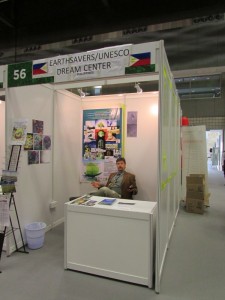Unlike previous UN climate gatherings, COP-18 in Doha is attempting to make a “serious” statement about lowering its carbon footprint. No, it’s not requiring delegates to forgo their jet travel, five-star hotels and restaurants, air conditioning, limousine rides, or anything that exacting.
But the COP chieftains have instituted a “paperless” policy, depriving delegates of daily programs and copies of negotiating documents that keep them relatively informed. And while this policy has allegedly “saved” 217 trees as of yesterday (I know this because the U.N. keeps a running tally prominently displayed on electronic billboards throughout the conference site), it has angered many who find this policy a means to keep the public in the dark about the current status of demands and negotiations.
programs and copies of negotiating documents that keep them relatively informed. And while this policy has allegedly “saved” 217 trees as of yesterday (I know this because the U.N. keeps a running tally prominently displayed on electronic billboards throughout the conference site), it has angered many who find this policy a means to keep the public in the dark about the current status of demands and negotiations.
Cathie Adams, president of the Texas Eagle Forum, made this point at a CFACT press briefing in Doha yesterday. She noted that in all her 17 years of attending U.N. climate gatherings there has never been this much difficulty getting up-to-date information or reluctance to accomodate
informed public input into the process. A harsh indictment, indeed.
The U.N. sought to compensate for this inconvenience by creating an app that delegates could place on their smart phones, which featured links to various documents as they are updated. However, the app has been extremely slow in posting any changes online, rendering it essentially useless.
Ms. Adams believes, as do many other delegates (even those on the fringe left), that this is being done deliberately, to squelch public input into a process that could affect energy and economic systems; lives and livelihoods; and jobs, hopes, and dreams for billions of people. That is very probably the case.
Whether or not it was the COP chiefs’ intent, the absence of information has made for a lot of frustration, as well as downtime lounging in coffee shops for most in attendance here.
Without much inside knowledge as to the current status of negotiations, many attendees looked to side events to pass their time or learn something. Some of these events, like those dealing with financing and mitigation, would test the endurance of a seasoned Buddhist monk. But others were more amusing, like an initiative known as “Chant,” which seems to be urging humanity to sing its way into environmental bliss. I had an opportunity to participate in this workshop and lend my own “voice” to this effort.
Anyone wanting to join in this eco-Woodstock event can do so by going here.
CFACT, for its part, put on a press briefing during this lull yesterday — calling on the U.N. to suspend its efforts to create a new climate change agreement. The press conference was attended by numerous media outlets including the Times of London, Associated Press, Chinese National Television and many others. It featured not only Cathie Adams, but also a video of Senator James Inhofe (R., OK), who stated:
“The focus of this year’s global warming conference — like all the conferences before — is not the environment. It’s about one thing: spreading the wealth around.”
Senator Inhofe went on to praise CFACT and Craig Rucker, Marc Morano, and Lord Christopher Monckton as voices of reason in the climate change debate. He added, “I have counted on groups like CFACT to provide on-the-ground reports” that keep America and the world informed.
To view the entire press conference, click here.
Meanwhile, despite keeping the public and delegates in the dark, negotiators continued to negotiate. The Ad-hoc Working Group advanced its amendments for a second commitment period to the Kyoto Protocol, and Christiana Figueres announced that the Ministers are now set to approve them. A final document was expected today, but we’re going into overtime.
Of course, all this will have minimal impact on global greenhouse gas emissions and atmospheric concentrations of those gases — to say nothing of the Earth’s climate and weather, which are driven by dozens — even hundreds — of complex natural forces.
Russia, Japan, and Canada have formally withdrawn from the process. Brazil, China, India, and the rest of the developing world will still be held to no binding commitments. This leaves largely the EU nations and Australia (which together represent approximately 15 percent of global emissions) as the only countries left to carry the economic wrecking ball of hydrocarbon and CO2 emission limitations.
There is no word yet on what the U.S. delegation plans to do. However, it is clear that the delegation will have a hard time selling to Congress whatever ultimately comes out of Doha.
This article originally appeared at National Review


